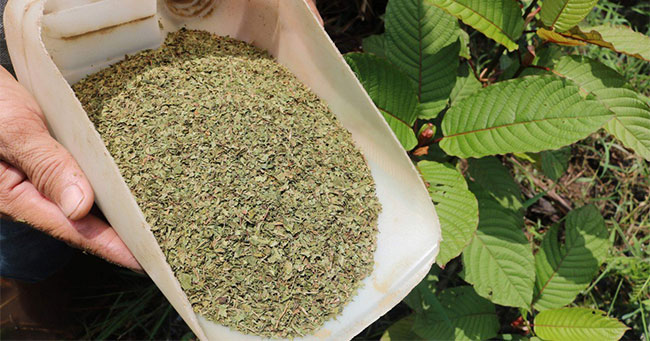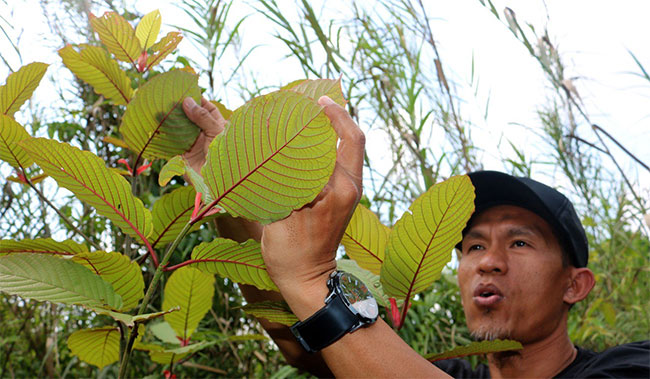'Herbal Heroin' - Indonesian farmer's livelihood
Kratom leaves may affect morphine-like brain receptors. Because of this, kratom has become a popular herb, but is also being abused as a narcotic.
Kratom , a tropical leaf plant increasingly used worldwide as a painkiller, as an alternative to opioids, may be under scrutiny in the West, but in Tuana Tuha, a village. East of Borneo, Indonesia, it is considered a godsend, a livelihood of the people.

Kratom leaves dry after processing.(Photo: AFP).
The controversy about Kratom
According to the South China Morning Post, Kratom, or Mitragyna Speciosa, originated from Indonesia, Thailand, Malaysia and Papua New Guinea. Its leaves contain compounds that can affect morphine-like brain receptors. Therefore, Kratom became a popular herb.
However, Kratom use is being considered in the US, where more than 130 people die each day from opioid overdoses. The US Food and Drug Administration has warned of consuming 'this herbal drug' , although they have stopped claiming it is a banned substance.
In Indonesia, the country's anti-drug agency wants the Ministry of Health to classify Kratom as a first-class psychotropic drug, such as heroin and cocaine. A drug offender on this list faces a maximum penalty of 20 years in prison."We are asking the Ministry of Health to classify it as a Class I. Kraton drug 10 times more dangerous than cocaine or cannabis ," the South China Morning Post quoted Yunis Farida Oktoris Triana, Deputy. reintegration room at the Indonesian National Drug Agency [BNN], said recently.

The Kratom farmer in Indonesia, Gusti Mitchu.(Photo: AFP).
The American Kratom Association estimates that there were 15.6 million Kratom users in the US as of June 2019, and the industry is worth more than a billion dollars. In 2016, the US Agency for Drug Prevention (DEA) proposed upgrading Kratom to a Class I drug, putting it on par with heroin, LSD and MDMA. But the proposal met with a backlash and was eventually withdrawn, although Kratom's attributes still cause concern for users to get addicted or other side effects.
Last month, for example, a Florida resident was arrested after leaving a disabled man he was looking after to die in a hot minivan. This person fell asleep indoors after eating two packets of Kratom.
In the US, Kratom is illegal in six states, including Alabama and Wisconsin, while in Europe it is considered illegal in Ireland, Sweden, Latvia, Lithuania, Poland and the UK but legally in Germany, France and Spain. In the West as well as in Indonesia, Kratom is easy to order on the Internet, in the form of green powder, tea or chewing gum.

Two women screen Kratom leaves in Tuana Tuha village in East Kalimantan.(Photo: SCMP).
The tree picks money leaves
Kratom is a native plant in Tuana Tuha, a 3,000-people village, a four-hour drive from the Samarinda capital of East Kalimantan that is expected to cost US $ 33 billion.
Kratom trees, called Kedemba in the local language, belong to the coffee family and can be up to 7 meters high. They are quickly becoming the main source of income for the villagers, replacing palm oil and fishing.
"Kratom are wild plants that grow in the garden and throughout our village. The 1,200-hectare site that was once a palm plantation, is now full of Kratom trees ," said Tommy, Head of Tuana Tuha Village, 29 years old. 'Here we have a saying, that with kedemba, finding a tree means that we find money.'
Tuana Tuha villagers used to fish for a living, but the unstable living conditions forced many of them to give up this livelihood. In late 2017, a man from Pontianak, the capital of the neighboring West Kalimantan province, came to the village to buy Kratom leaves. He told the villagers that the leaf was in high demand overseas.
'The villagers here have a custom for giving newborn babies to drink boiled kedemba bark water to clean up dirty blood and recover health, but we never eat leaves , ' ' said Tommy. "So we believe when he said that foreigners use kedemba as an herb."

A farmer stands by the Kratom tree in his garden.(Photo: SCMP).
The villagers initially found it difficult to pick Kratom leaves because no one taught them how to do so.
Kratom leaves are thin and very different from other crops like rice and corn. Iksan Maulana, one of hundreds of Kratom pickers in Tuana Tuha, said. "When I first started, I only picked 50kg per day." Now Iksan can pick up to 200kg of leaves a day, earning 400,000 rupiah (28 USD) / day for seven hours of work.
Tuana Tuha Village achieved the highest production from January to May this year, when 300 villagers picked up to 50 tons of kratom leaves per month, generating a revenue of one billion rupiah (US $ 70,600).
Under Borneo's bright sunlight, the leaves dried quickly in just six hours, then placed in a blender. The final step is screening, to separate leaves and branches. The dried debris is then packed into sacks sold to exporters in West Kalimantan.
While leaf pickers in Tuana Tuha still rely on existing Kratom trees, in Sebelimbingan village about 36 km away, farmers are starting to plant trees. Sauqani, a 44-year-old bird nest seller, planted 17,000 Kratom trees on a 2-hectare plot six months ago. He hopes to harvest by the end of this year, with a production of 5 tons of dry Kratom leaves.

Description of dried Kratom leaves.(Photo: SCMP).
However, the fact that the law does not specify the legality of the Kratom leaves could put the future of villagers in Tuana Tuha and Sebelimbingan in uncertainty. The Indonesian anti-drug agency's plan to criminalize the use of Kratom raises questions about the future of newly built Kratom plantations.
"We are trying to assure the government that Kratom is not being abused in Indonesia. If it is abused in the US, it is not the responsibility of Indonesian Kratom farmers," said Sauqani. "Look at cigarettes. They obviously cause cancer and heart disease, but are still sold freely. This should also apply to Kratom," the kratom farmer said.
- All you need to know about heroin
- Herbal - the perfect complement to western medicine
- Vaccines help reduce heroin addiction
- Bao Thanh lozenges - Traditional herbal supplements, except for the most commonly used cough
- Russia discovered dangerous drugs than heroin
- Production of herbal anticancer drugs
- Why heroin and morphine are addictive
- The fish has venom like heroin that makes enemies faint
- The power of Indonesian tsunamis surprised the researchers
- Alcohol is more harmful than heroin
- Indonesian airplanes abruptly increased their height and plunged into the sea with incredible speed
- Drinking tea from St. John's grass overdose may be the trigger for psychosis
 Why do potatoes have eyes?
Why do potatoes have eyes? 'Tragedy' the world's largest carnivorous life: Death becomes ... public toilet
'Tragedy' the world's largest carnivorous life: Death becomes ... public toilet Tomatoes were once considered 'poisonous' for 200 years
Tomatoes were once considered 'poisonous' for 200 years Detecting microscopic parasites on human face
Detecting microscopic parasites on human face